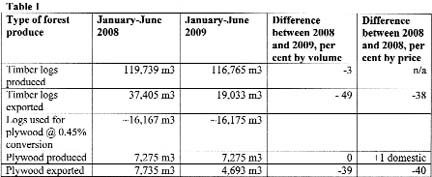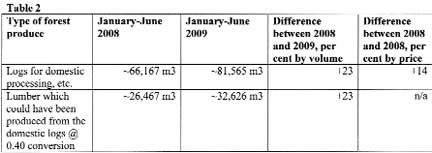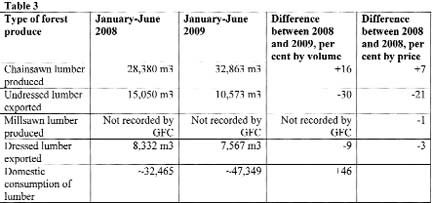In reply to the letter from the Commissioner of the Guyana Forestry Commission, Mr James Singh (‘Log exports have declined,’ SN January 12), I suggest that the Commissioner is not properly interpreting even the limited sets of data which the GFC publishes in the Forest Sector Information Report. The last data were for January-June 2009, which we can compare with the same half-year in 2008. In the following tables, the til sign (~) means an estimated value, not a figure reported by the GFC:



The GFC is thus expecting us to believe that there has been an almost 50 per cent rise in domestic consumption of sawnwood, paralleled by a 1 per cent drop in domestic price, while chainsawn lumber has risen 7 per cent in price and domestic logs by 14 per cent. The GFC offers no commentary on these figures, nor on the apparent falls in export volumes and prices in all types of forest produce. Given the preference for construction in concrete, where can we see such a large increase in use of sawn timber in Guyana, and why was there no marked fall in the domestic lumber price as a result of the extra supply?
It is also notable that, for flooring and furniture quality timbers produced by other tropical countries and technically equivalent to those from Guyana, the prices paid on Asian markets for those logs did not decline. Indeed, in spite of the global economic depression and a sharp drop in exports of furniture from China, the average price for logs imported by China from Guyana continued to rise, as reported by China Customs. The GFC does not report such data. In contrast, the GFC reports that the best quality timbers (Special Category and Class 1) declined by 58 and 26 per cent in log export volume.
A more reasonable explanation is that there has not actually been an increase in production and consumption of domestic sawnwood, but instead a gross under-reporting of the export of logs. This would have been facilitated by the increase in containerization. False reporting of exports is an offence against the Customs Act (Cap. 82:01, Articles 157 and 158). Other letters to the independent press in Guyana have pointed out that the increase in export commission on unprocessed timber logs from 2 to 7 per cent in 2009 and to 10 per cent in 2010 is unlikely to stimulate a preference for domestic processing when profits on logs exported to Asia are so vast. This was also pointed out at the public meeting on a log export policy in February 2007, when 8 of the 10 working groups voted in favour of a full ban on log exports from March 1, 2007 (Post Consultation Summary Report. National Log Export Policy. GFC, March 2007). But the government did not accept this majority vote, in spite of it being consistent with the agreed national policies on in-country processing of natural resources. The PPP election manifesto in 2006 stressed four times its commitment to value addition in forest products, but the government has failed to implement its own manifesto in this respect.
Barama’s foreign direct investment (FDI) arrangement from February 1991 is specific about exemption from taxes and includes the following clause 8.2 on export tax:
“Export tax is now applicable only to the export of Greenheart round logs. The Government and the Company agree to set an export tax rate for greenheart logs for the three (3) year period commencing from the first export shipment of such logs. No export tax shall be applicable to logs except greenheart round logs, nor any other tax or impost on export of logs, nor shall there be any tax, duty, charge or fee applicable to plywood, veneer or other wood related products.”
A stability clause (17) in this FDI arrangement prevents adjustment by the government of such unreasonable allowances.
Yet the GFC Commissioner notes in his letter that it is incorrect to say that Barama only pays export commission on greenheart logs. Perhaps the GFC will now publish in full the FDI arrangement so that we can see the true story? Perhaps the government can also explain why Barama continues to receive full tax concessions yet runs its plywood mill at 1/5 (in 2008) or 1/10 (in 2009) of its production capacity, preferring to export unprocessed logs?
As regards bulletwood, the Forest Regulations (Article 20 (1)) are explicit that this is a protected species of tree. While the forest law does not apply to private lands, and thus to Amerindian titled village lands, the bulk of the bulletwood being exported is coming from State Forest.
The GFC could argue that the protection for bulletwood in the 1953 Forest Regulations was primarily because of the historical importance for rural livelihoods of balata bleeding and only secondarily for the ecological importance of bulletwood as a keystone species. But the GFC does not argue at all, nor advise the Minister to amend the Forest Regulations, but simply allows apparently unlimited felling of this protected species and unlimited export. So the GFC brings the law into disrepute and fails to promote the national policy on in-country processing.
Yours faithfully,
Janette Bulkan




